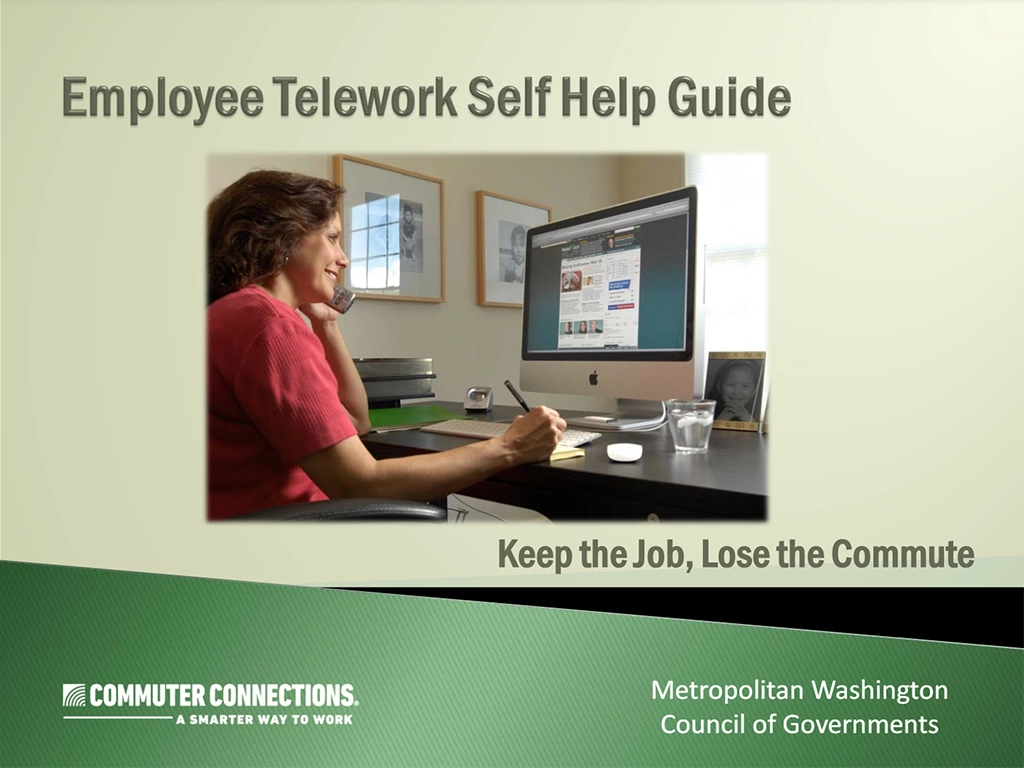More and more commuters are discovering a smarter way to work by teleworking. Rather than commuting to the office every day, they work at home, or at a shared workspace, at a coworking center, telework center, or from an employer’s satellite office one or more days a week. To learn more about how teleworking can improve your lifestyle while keeping your boss happy, please download our employee help-guide. This help-guide is designed to help individuals determine if telework is a suitable option for them, and, if so, how to introduce or expand a telework program within their organization. Topics include:
Teleworking
Ever wonder why you have to work so hard to get to work?
- Telework Defined
- What Telework is Not
- Trends & Projections
- Benefits
- Is Teleworking for You?
- Options
- Equipment
- Possible Distractions
- Approaching Your Supervisor
- Ready, Set, Go…
- Successful Teleworking
- What if You Get Turned Down?
- Resources
The guide also includes a virtual tour of our Shared Workspaces/Coworking Spaces/Telework Centers, the services provided at the facility and related costs.
DID YOU KNOW?
34% of the Washington metropolitan region’s workforce teleworks at least 1.2 days per week on average. Interested in Teleworking?
Best Practices
Communication
- Do confer with your supervisor on organizing work for the telework days
- Make sure that team members and supervisors have a clear idea of the day(s) you will be teleworking
- Forward office phone to your home phone if possible
- Keep your boss informed of the progress you are making as needed
- Attend on-site or virtual essential department and group meetings
- Respond to communications such as calls, emails, and texts
- Inform family members and neighbors about when you may be interrupted
Productivity
- Do select assignments and deliverable that can be performed remotely
- Develop tasks and deliverables
- Make sure you develop a routine for the telework days
- Stick to all deadlines and keep your work organized
- Do treat your telework day as you would a regular day in the office
Ergonomics & Safety
- Have a dedicated workspace at home
- Set up the workspace in an area that is safe and free from hazards
- Do pay attention to the ergonomics of your dedicated workspace at home
- Items to consider are desk height, chair, lighting, safety, electrical support, noise
- Take breaks throughout the day
- Have lunch away from your desk
What to Avoid
Habits
- Don’t develop bad habits at home
- Don’t start sleeping late on telework days
- Don’t stay in your bedclothes all day
- Don’t let pet or other noise impair your professional image, especially when you are talking on the phone
Productivity
- Don’t forget that your employer is paying you to do your work during the agreed-upon hours
- Don’t run errands for everybody in the neighborhood just because you are home
- Don’t telework if you have an infant or an elderly person who requires your attention
- Don’t answer personal calls during telework day
- Don’t do household chores during telework day
- Don’t visit personal social media web sites such as Facebook and Instagram, they are distracting
- Don’t telework, if it is not working for you
Shared Workspaces
Communicate seamlessly with your office, colleagues, customers, and potential customers. These locations provide entrepreneurs, growing businesses, and established corporate teleworkers with a variety of settings. Features include workstations, high-speed internet, and other amenities which may consist of photocopiers, VoIP/telephony, meeting rooms, and video conferencing.
In general, shared workspaces and Telework Centers are better suited for more established professionals. These types of locations work on a twelve-month lease arrangement and are known for providing more traditional amenities such as conference rooms, professional office furniture, photocopiers, audio-visual equipment etc. Some also offer receptionists, pantries, and separated private offices. Coworking spaces are more ideal for start-up businesses, freelancers, and entrepreneur-types looking for an affordable creative atmosphere to pursue their passions. Usually, coworking spaces can be leased for a shorter period, between three and six months.
There are countless facilities in the Washington, DC metropolitan region, each offering a unique, productive, and flourishing environment. Regardless of location, each offers a surrounding of like-minded people and allow for independence while at the same time a collaborative, supportive community not available when working from home.
Below are just some of the many work centers within the region:
- AdvantEdge
- Bureau
- Carr Workplaces*
- Cowork Frederick
- Creative Colony District (formerly DC Workspaces)
- Inclusive Innovative Incubator
- Industrious
- Mindspace
- Oval Offices
- Regus*
- Spaces
- The Cove
- The Hive
- The Hub
- The Yard
- Wework*
* Multiple Locations

